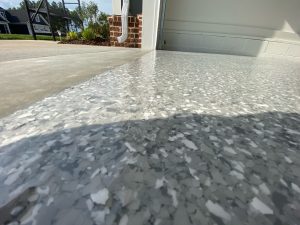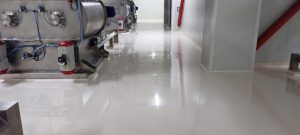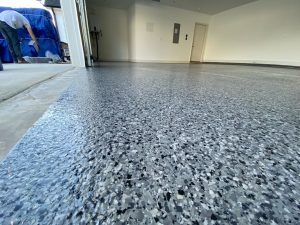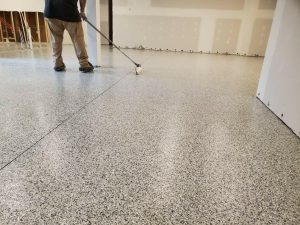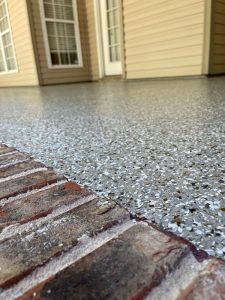A well-coated basement floor not only enhances the look of your space but also protects it from moisture, stains, and wear. Whether you’re turning your basement into a living area, gym, or storage space, choosing the right floor coating is crucial. In this guide, we’ll explore the best basement floor coatings for 2025, their benefits, and how to choose the perfect option for your home.
Why Basement Floor Coatings Matter
Basement floors are prone to moisture, cracks, and stains. Without proper protection, they can become a breeding ground for mold and mildew. A high-quality floor coating offers:
- Moisture Resistance – Keeps water from seeping into the concrete.
- Durability – Prevents cracks, stains, and general wear.
- Enhanced Aesthetics – Transforms a dull concrete floor into a polished, stylish surface.
- Easier Maintenance – Makes cleaning spills and dust effortless.
- Improved Safety – Reduces slipperiness and increases traction.
Top Basement Floor Coating Options for 2025
Each type of basement floor coating offers unique advantages. Here are the best options for 2025:
1. Epoxy Coatings
Best for: Home gyms, entertainment rooms, and high-traffic areas.
Epoxy is one of the most popular basement floor coatings. It forms a strong, protective layer over concrete, making it resistant to stains, moisture, and impact.
Pros:
- Highly durable and long-lasting
- Resistant to chemicals and stains
- Available in various colors and finishes
Cons:
- Can be slippery when wet
- Requires professional installation for best results
2. Polyurea Coatings
Best for: Homeowners seeking a quick, long-lasting solution.
Polyurea coatings are becoming a top choice due to their fast curing time and superior durability. They are more flexible than epoxy, making them less prone to cracking.
Pros:
- Cures in just 24 hours
- UV-resistant, preventing yellowing
- Extremely durable and moisture-resistant
Cons:
- More expensive than epoxy
- Requires professional application
3. Concrete Stains and Sealers
Best for: Budget-friendly basement upgrades.
Concrete stains and sealers offer a simple way to enhance the appearance of basement floors without a thick coating. While they don’t provide as much protection as epoxy or polyurea, they still improve resistance to moisture and stains.
Pros:
- Affordable and easy to apply
- Enhances the natural look of concrete
- Available in various colors
Cons:
- Requires reapplication over time
- Less protective compared to epoxy or polyurea
4. Rubber Floor Coatings
Best for: Playrooms, home gyms, and basements used for exercise.
Rubber floor coatings provide cushioning, making them ideal for spaces where comfort and shock absorption are needed. They also help with soundproofing.
Pros:
- Soft and comfortable underfoot
- Great for impact absorption
- Reduces noise
Cons:
- Can be expensive
- Limited design options
How to Choose the Best Basement Floor Coating
To select the right coating, consider these key factors:
- Purpose of Your Basement – If you’re using it as a living space, a durable and stylish option like epoxy is ideal. For storage, a simple sealer may be enough.
- Moisture Levels – If your basement has high humidity, opt for moisture-resistant coatings like polyurea or epoxy.
- Budget – Concrete stains and sealers are the most affordable, while polyurea coatings come at a higher cost.
- Installation Preference – DIY-friendly options include concrete stains and some epoxy kits, whereas polyurea and professional epoxy installations require expert help.
Step-by-Step Guide to Applying Basement Floor Coatings
If you plan to coat your basement floor yourself, follow these steps:
Step 1: Prepare the Surface
- Clean the floor thoroughly, removing dust, grease, and debris.
- Repair any cracks or holes in the concrete.
- Etch the surface if required (especially for epoxy and polyurea coatings).
Step 2: Choose the Right Coating
- Select the best coating based on your basement’s use and budget.
Step 3: Apply the Coating
- Follow the manufacturer’s instructions.
- Use a roller or brush to apply the coating evenly.
- Allow proper drying time before applying additional layers.
Step 4: Let It Cure
- Epoxy takes 72 hours to fully cure, while polyurea can be ready in 24 hours.
- Avoid foot traffic until the coating is completely dry.
Maintenance Tips for Basement Floor Coatings
- Sweep and Mop Regularly – Prevents dirt buildup and stains.
- Avoid Harsh Chemicals – Use pH-neutral cleaners for longevity.
- Reapply Sealer (if needed) – Some coatings may require periodic resealing.
- Use Rugs or Mats – Helps protect high-traffic areas.
Why Choose ICM Coatings for Your Basement Floors?
At ICM Coatings, we specialize in high-quality basement floor coatings designed to enhance durability, appearance, and moisture resistance. Serving Greater Mississippi, we provide expert installations using top-tier materials, ensuring long-lasting protection for your basement. Our experienced team tailors each coating solution to your specific needs, offering professional guidance from start to finish.
Our Services Include:
- Professional epoxy and polyurea coatings
- Moisture-resistant solutions for high-humidity basements
- Quick turnaround with expert installation
- Affordable, high-quality products with lasting performance
Final Thoughts
Investing in a high-quality basement floor coating can make your space more functional, durable, and visually appealing. Whether you choose epoxy, polyurea, or a simple stain, the right coating will enhance your basement for years to come. Ready to upgrade your basement floor? Contact ICM Coatings today and let our experts transform your space!

